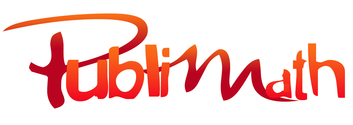History and Epistemology in Mathematics Education: Proceedings of the Sixth European Summer University (ESU 6). An implementation of two historical teaching modules. Outcomes and perspectives. p. 139-151.
(La mise en oeuvre de deux modules d'enseignement d'histoire : résultats et perspectives.)
Une version texte intégral est en téléchargement sur le site Bibliothèque numérique des IREM et de l’APMEP Télécharger
Auteur : Jankvist Uffe Thomas
Résumé
L’auteur fait la distinction entre deux utilisations différentes de l’histoire des mathématiques dans l’enseignement des mathématiques : Abstract Distinguishing between two different uses of history of mathematics in mathematics education (history as a tool to enhance the inner issues – in-issues – of mathematical topics, concepts, methods, etc.; and history as a sort of goal, in the sense that it is considered a goal to teach students something about the historical development of mathematics, its influence on society and culture as well as the other way round, and the fact that mathematics is a human endeavour and the development of mathematics therefore likewise – that is to say some of the more meta-perspective issues – meta-issues – of mathematics) the present presentation concerns an empirical investigation of the use of history as a goal. More precisely two longer historical teaching modules were designed and implemented in a Danish upper secondary mathematics class in order to answer the following research questions:
– l’histoire en tant qu’outil pour améliorer les questions internes : objets mathématiques, concepts, méthodes, etc.
– l’histoire en tant qu’objectif, au sens où l’on considère comme un objectif d’enseigner aux élèves quelque chose sur le développement historique des mathématiques, son influence sur la société et la culture et le fait que les mathématiques sont une activité humaine (c’est-à-dire certaines des questions les plus « méta » des mathématiques).
Le présent article concerne une investigation empirique de l’utilisation de l’histoire comme objectif.
Il analyse , plus précisément, deux modules d’enseignement historiques conçus et mis en œuvre dans un cours de mathématiques au deuxième cycle du secondaire danois afin de répondre aux questions de recherche suivantes:
1. Dans quel sens, dans quelle mesure et dans quelles conditions est-il possible d’engager des étudiants de fin de Lycée dans des discussions de méta-question et les réflexions sur les mathématiques et son histoire en termes d’ « histoire comme objectif »?
2. Dans quel sens et à quels niveaux un ancrage des discussions et des réflexions sur le méta-problème dans l’objet d’enseignement peut-il être atteint et « assuré » à travers une « approche modulaire » ?
3. De quelle manière des modules d’enseignement axés sur l’utilisation de « l’histoire comme objectif » peuvent-ils entraîner des changements dans les croyances des élèves concernant la discipline « mathématiques »
Les modules décrits portaient sur l’histoire des codes correcteurs d’erreur, et sur la cryptographie à clé publique.
1. In what sense, to what extent, and on what conditions is it possible to have upper secondary students engage in meta-issue discussions and reflections of mathematics and its history in terms of « history as a goal‟?
2. In what sense and on what levels may an anchoring of the meta-issue discussions and reflections in the taught and learned subject matter (in-issues) be reached and « ensured‟ through a « modules approach‟?
3. In what way may teaching modules focusing on the use of « history as a goal‟ give rise to changes in students‟ beliefs about (the discipline of) mathematics, or the development of new beliefs?
In the presentation I shall mainly focus on the two first questions, displaying data from the implementation of the teaching modules to support possible answers to these. This involves also, for example, a discussion of certain design principles for using history in mathematics education. The third question shall only be touched upon briefly, outlining the main results.
The above mentioned research will be related to the body of empirical research already available in the field of using history in mathematics education, thereby also discussing the status of this field from an empirical point of view as well as the role and perspectives for future empirical research within the field.
Notes
Chapitre des Actes de la sixième université d’été (ESU 6).
Données de publication
Éditeur Verlag Holzhausen GmbH Vienne , 2011 Format p. 139-151 Index Bibliogr. p. 150-151
ISBN 3-85493-208-1 EAN 9783854932086
Public visé chercheur, enseignant, formateur
Type chapitre d’un ouvrage Langue anglais Support papier
Classification
